From April 8th to 9th, the first national university-level Law of the Sea Moot Court Competition was successfully held in Wuhan University. It was co-organized by the Collaborative Innovation Center for Terrestrial Sovereignty and Maritime Rights, the International Cooperation Department of the State Oceanic Administration and the WHU China Institute of Boundary and Ocean Studies. Host Wuhan University was crowned the champions of the competition, China Foreign Affairs University was the first runner-up, and Hainan University and Fudan University shared the third place. Students from the 13 best universities across the nation participated in the competition.
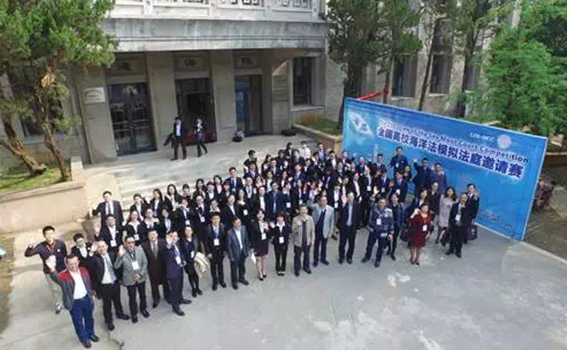
All the staff of the organizing committee
Moot Court, a mock court case for law students, either undergraduate or postgraduate, is aimed at teaching them the workings of the legal system and the craft of arbitration and mediation. This format prepares and paves the way for up-and-coming legal talent for a successful and assured career in law through rigorous practice and memorial writing. The mooters role-play as a client or an attorney (claimant and respondent) during mediation proceedings on specific hypothetical cases of dispute resolution and orally plead both positions in front of an arbitral tribunal. Unlike real court cases, the arguments are time-barred and students have to maintain a specific framework within which they can summarize all their arguments and strategies with full discretion. Law institutions nowadays bespeak for such competitions to foster team spirit, confidence and a deeper understanding of the legal system among law students
This contest, as the first of its kind in China, will be the precedent for many more domestic maritime law moot courts in the future. The competition brought together eminent professors, lawyers, diplomats and judges under one roof to assess the students’ coherent analysis on maritime disputes. Under such mounting pressure, those resilient and open-minded students did not shrink. Instead, they had demonstrated an extraordinary degree of commitment throughout the contest and managed to deliver legal briefs with eloquence. It was also a unique opportunity to socialize with fellow participants and practitioners from all over China in a relaxing setting.
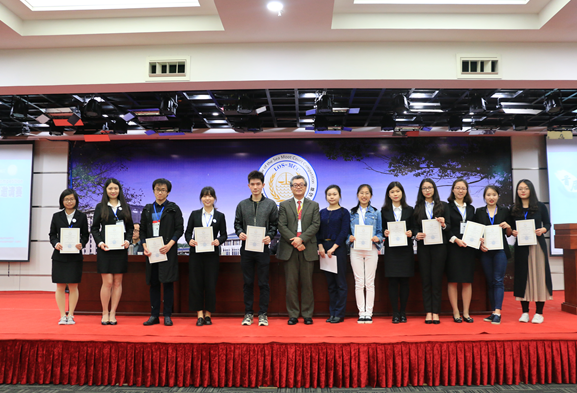
12 Best Oralists
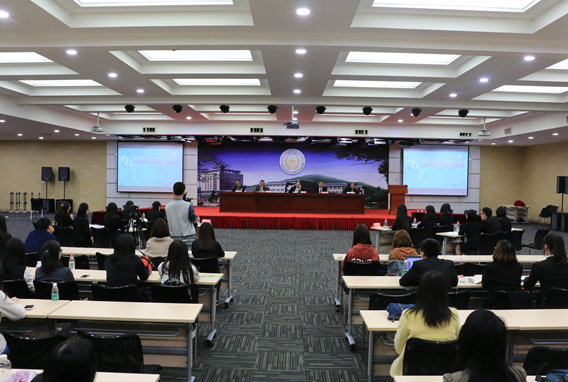
The judging panel for the finalists
On the first day of the competition, mooters convened at the WHU China Institute of Boundary and Ocean Studies for the preliminary sessions. The competitions kicked off with an opening ceremony. In his keynote speech, Wang Chuanzhong, vice chair of the University Council pointed out that China is a party to the United Nations Convention on the Law of the Sea, and that China is also accelerating the process of national law with regard to the Law of the Sea.
This year’s Moot Problem focused on a dispute arising out of the use of the equidistant middle line and traditional custom line (angle bisector) in the maritime delimitation, whether the International Tribunal for the Law of the Sea has jurisdiction over the demarcation of the continental shelf beyond 200 nautical miles, and the principle of fairness in fishing, oil and gas activities with regard to delimitation of the sea.
The preliminary four rounds decided who made it through to the semi-finals, in accordance with the result in rankings. Case trial is divided into two stages, first is the submission of book-like material (memorial), and the second is the process of mock trial. Memorials were submitted in early stages. As per the division of labor, different students are responsible for different topics during the oral stage. There were three speakers and three investigators, and each investigator had to assist a speaker and hence, everyone had to work together to complete the rounds within the time limit.
After drawing lots, pleadings, and heads of arguments were distributed. To ensure fair competition, each team was not put in the same position (plaintiff / defendant) at the same time. The result was announced by the organizing committee later before dinner on the first day of the competition.
The closing ceremony for the next day was held at the academic lecture hall in the main library. The final four teams gave their very best. The best mooters were pitted against each other and their excellent ability to articulate and refute became evident with each progressing session. Then, judges passed on their valuable comments and suggestions for all the participating students and congratulated everyone as the competition turned out to be a huge success.
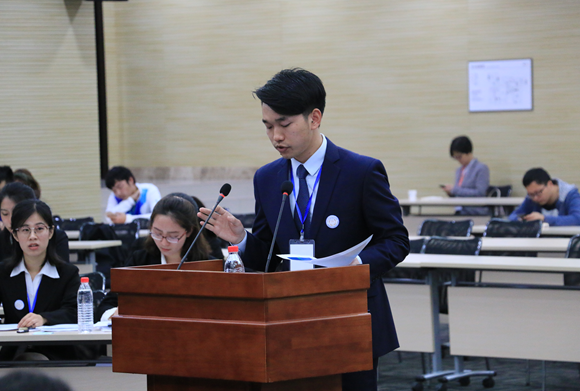
A mooter addressing his pleadings
“There is no end to the perfection of your legal argument.” commented Professor Gao Shengti at the closing ceremony, “There is always a loophole for any legal argument. I encourage you to do more”. He then talked about time management in such contests: “Time is too short for you to finish your arguments. But this ability to try to be efficient, to get your argument first and work in limited time, will benefit your future career. Be careful not to make mistakes; you need to be more careful, so you won’t waste what you have achieved. He also encouraged the other non-participants at the event, “I encourage those students who feel they are losers—you should try to do it yourselves next time. It’s a very special kind of learning.”
The winners were announced after the jury review. Some of the winners will be given a bonus opportunity to visit the International Court of Justice at the International Tribunal for the Law of the Sea in Hamburg, Germany, which is funded by the Collaborative Innovation Center for Territorial Sovereignty and Maritime Rights. They will also have the opportunity to obtain an internship recommendation from the Tribunal.
Each team had experienced coaches, team leaders and supervisors to guide them through the contest and help them overcome all sorts of rhetorical and didactic challenges. The teams gained practical insight into the ocean law and arbitration with their interaction with such experienced law practitioners in the jury. The mooters were judged based on how substantial their argument is, their ingenuity, persuasiveness, conviction, as well as their familiarity with international tribunals and the procedures involved in maritime law jurisdictions. It is fundamental that the mooters have a general idea of the core immutable international territorial laws. All the teams tried to support their arguments with valid references of past cases rather than a prima facie approach. They had to come up with well-rounded legal solutions to international disputes which can be admissible by both sides.
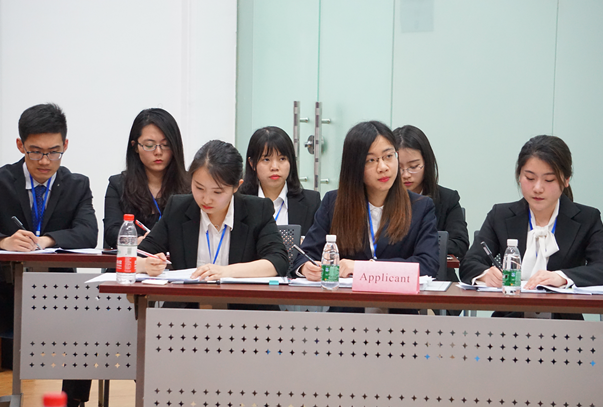
A team in the preliminary round
In order to participate in the first Marine Moot Court Invitational Tournament, instructors and students prepared for more than three months. During the winter break, teachers and students of the organizing committee went to Hamburg, Germany to observe the real case of the maritime court. Their instructor Wu Wei repeatedly consulted the Marine Tribunal on the technical issues of the court debate for the competition.
In the course of preparing for the competition, team members had undergone training for legal research, debating skills, court etiquettes, memorial writing and English speaking. “We learnt international law from an English textbook in the winter vacation. Every day we had about 40 pages of reading, frequently involving a Q&A session,” said mooter Wang Lingbo from Wuhan University, who was awarded with Best Oralist.
“If you want to ask our team’s glittering point, it should be a group of young people who have a passion for China’s maritime law, who are willing to use their own time and energy and to challenge themselves,” said instructor Wu Wei from Wuhan University, who also won the Best Advisor award.
Team captain Li Xin from the Law School of Beijing Normal University, who had also competed in the 2017 (Jessup) International Moot Court Competition, shared that “It was very challenging for me and my team to prepare for this competition. Supplementing the knowledge of international marine law has always been our top priority.”
Li Xin also thanked her teachers Zhao Yingjun, Li bin and Liao Shiping, “Thanks to our teachers’ professional guidance, we were able to master the methods of learning international law and get a comprehensive grasp of the court cases for analysis,” she added further, “With the continuous emergence of the South China Sea-related issues and other issues of the sea, to defend China's maritime rights and interests has become one of the priorities of China's foreign affairs. As a law student, we should learn more about the knowledge of the law of the sea, pay attention to the current affairs and safeguard the legitimate rights and interests of our country”
He Hongmi, head supervisor of Hainan University Law School team, said: “Instructors were very responsible for specific guidance. We began to prepare for the competition after receiving the invitation. With the college’s support and teacher guidance, unity cooperation and hard work, our team members achieved second runner's outstanding achievement. Great team!”
All the members of the judging team were China’s leading experts in the field of maritime law and moot court events. The only Chinese judge at the International Tribunal for the Law of the Sea, Mr. Gao Ziguo, served as the chief jury at the judging panel in the final. Besides him, Professor Gao Kun-ting, Dean of the South China Sea Institute of Xiamen University, Professor Gao Shengti of the Institute of Marine Law of the Taiwan Ocean University and Professor Luo Guoqiang of WHU Law School were the other distinguished judges.
The participating teams were the frontrunners in the field of ocean law which is pursued in several universities throughout China. Other nine universities won the second prize- East China University of Political Science and Law, Zhongnan University of Economics and Law, China University of Political science and Law, Ocean University of China, Peking University, Beijing Normal University, Tsinghua University, Huazhong University of Science and Technology and Xiamen University. Three teams won the best memorial (written submission) award, among which Fudan University, Hainan university and Wuhan university won the best plaintiff memorial, defendant memorial and comprehensive memorial award.
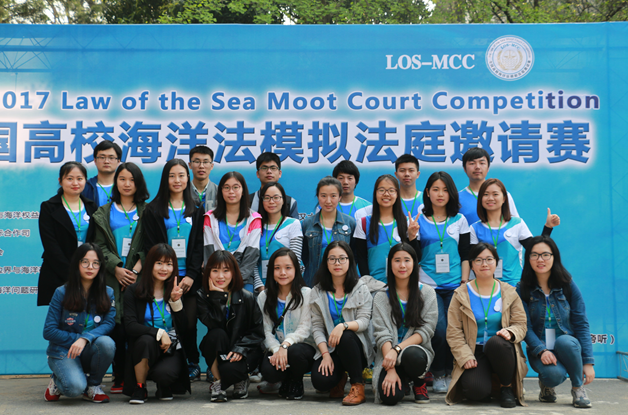
Volunteers of the Competition
Edited by Liu Jiachen, Wu Siying and Hu Sijia
Photo by Chen Ziyao, Shi Weimin and WHU China Institute of Boundary and Ocean Studies.